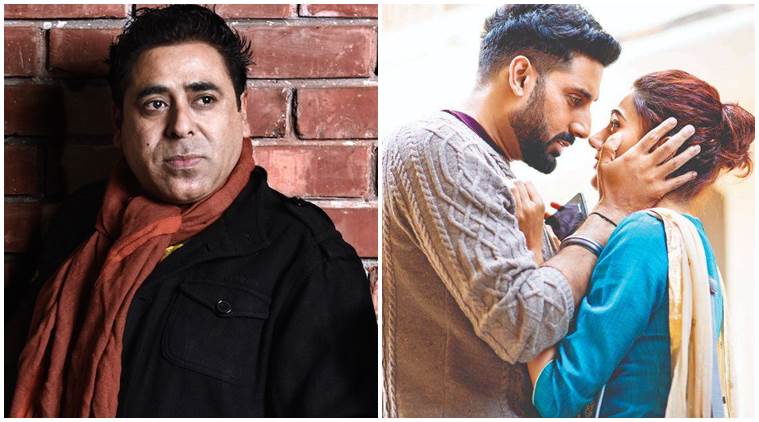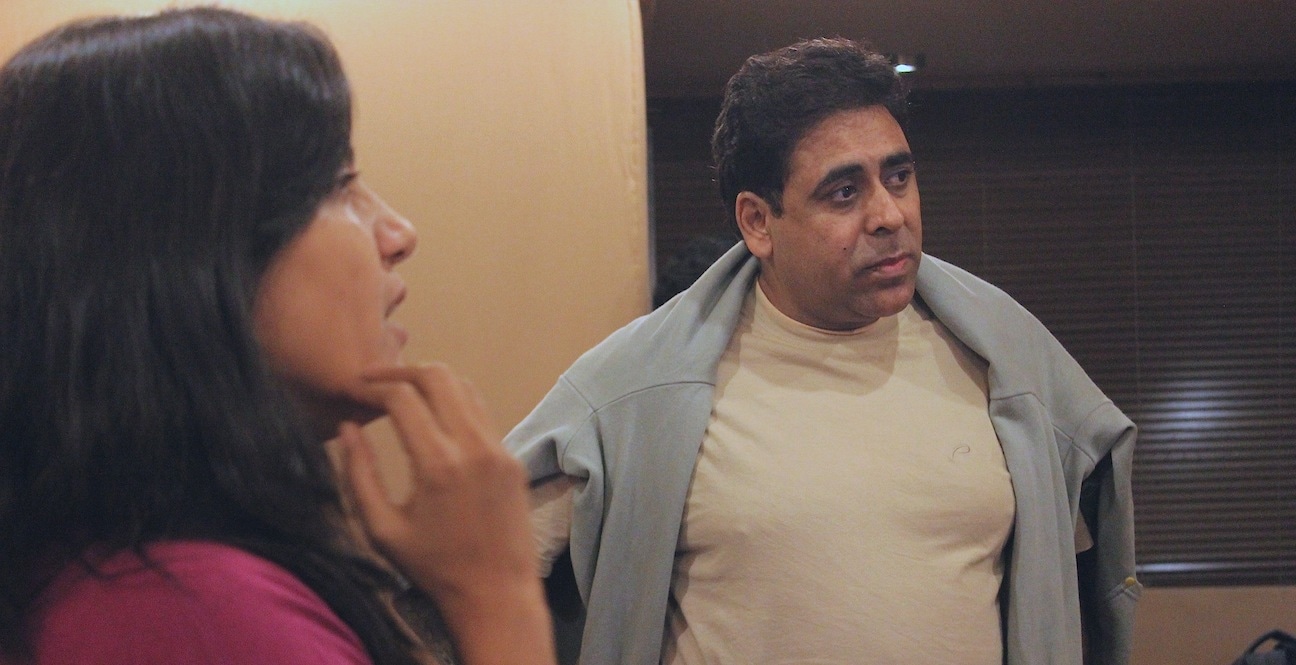 Shellee has written the lyrics of Manmarziyaan songs “Chonch Ladhiyaan”, “Grey Walaa Shade”, “Hallaa” and “Daryaa” among others.
Shellee has written the lyrics of Manmarziyaan songs “Chonch Ladhiyaan”, “Grey Walaa Shade”, “Hallaa” and “Daryaa” among others.
“I have been requesting people to listen to other songs from Manmarziyaan besides “Daryaa”. They tell me they can’t get out of it, as if it’s a handcuff!” says a perplexed Shellee.
“For me, the more intelligent tracks are “Chonch Ladhiyaan”, “Grey Walaa Shade” and “Hallaa”. I can write “Daryaa” even if I am out of my senses,” the poet tells indianexpress.com in an exclusive conversation.
Shellee aka Shailendra Singh Sodhi has previously written songs for Dev D and Udta Punjab, but he prefers to be called a poet. “I don’t like to be known as a lyricist because that label is restrictive in nature. People think you can only write to a tune, whereas I have so many poems,” he says.
The fact that Shellee’s film songs always reflect his voice is because he makes use of his poetry in these songs. He says, “In the love ballad “Chonch Ladhiyaan”, there’s a line ‘Bande andar Paighambar naache’ (God dances inside a man). This is from one of my poems. Some people did not like this. They have questioned it. Everyone has a different way of connecting with God. For me, God can reside inside me and I feel my God will never keep quiet. If I am in love, he or she will be jumping with joy and dancing!”
Similarly in “Hallaa”, sung by Jyoti Nooran, which describes the turmoil of Abhishek Bachchan’s character after he sees his wife and her former lover sharing an emotional moment, Shellee brings his old poetry to use, making the sequence one of the most poignant and powerful in the film.
“In “Hallaa”, there’s a line Ishaq lafz ka ‘I’ toot ke gir gaya. That’s also from one of my poems. Now, if you observe, if the ‘I’ of Ishq falls, what’s left is ‘shaq’, meaning doubt. That’s the essence of the pain he feels. These are the things I like to do in my songs but I did not know that people would understand such nuances. So, it feels good that they have actually observed these things and reached out to me,” he adds.
Shellee reveals he and the film’s music composer Amit Trivedi were unsure of how people would react to Manmarziyaan’s album because he had added a lot of experimental elements in the songs.
“I get bored of using one language purely. In “Grey Walaa Shade”, I have used many English words starting from the title itself. The nature of Vicky (Vicky Kaushal) and Rumi’s (Taapsee Pannu) relationship is how many modern relationships are. They are beyond black and white. The film does not judge these characters and their equation which has both love and lust. So, why should my song judge them?”
The poet’s non-judgmental take on modern romance is apparent in the lines which talk about “mutual favour” as well as the need of “updating the ghisa-peeta (orthodox) version” of love in the song “Grey Walaa Shade”.
“When we talk about Sahir Ludhianvi-Amrita Pritam love story, it also had grey shades. Even while living with Imroz, she spent a few nights with Sahir. So, you can’t go harping about being a purist. It’s all grey,” Shellee ruminates, while revealing he took notes from the legendary Sahir-Amrita-Imroz triangle for Manmarziyaan. “The layers in the film’s story resonated with this love triangle. This stayed with me.”
A reason that the film’s songs take the screenplay forward and complements it on every level is because Shellee and the Manmarziyaan writer and creative producer Kanika Dhillon were on the same page. Shelle says, “I always read my scripts four-five times. While reading Manmarziyaan script the third time, I realised the layers in the story and I knew it was a risky film. I knew it could go the wrong way if given in wrong hands. I know a lot of lyricists take the script but don’t read it. So, how will it reflect in the film’s songs?”
It also helped that both Shellee and Kanika were more than familiar with the roads and the people of Amritsar. “We both have seen men like Vicky in every other corner of Amritsar. I have seen love stories like Rumi and Vicky’s. So, I understood what Kanika was trying to say.”
Shellee, however, is quick to mention the contribution of his partner Amit Trivedi and the film’s director Anurag Kashyap. When Anurag joined the film, only one track “Sacchi Mohabbat” was ready, which was composed and written while director Sameer Sharma was helming the film. Shellee shares along with Anurag, came more shades to the three main characters and blind trust in him and Amit.

“He trusts us to an extent that he did not change even a single word in the album. His faith acts like a pillar. Because of that we feel conscious of delivering the best and also freedom to do what we want to do. He did not want another Dev D but wanted the same magic,” reveals Shellee.
While praising his director, who sat for long music sessions with him and Amit, Shellee says a lot of improvisation in Vicky’s character was courtesy Anurag. “The character shades changed after Anurag joined. Like, Vicky was always notorious and irresponsible. But somewhere, the intensity that he has, how he cries (for Rumi) is thanks to Anurag.”
Manmarziyaan marks Shellee and Amit’s third collaboration, and while the love between the two has only increased with each film, so have the fights. “We have major fights because the words I think will be known to all Amit thinks we should spoon-feed our listeners. He says, ‘Let’s make everything easy, pan-India.’ “Ramaiyan Vastaaiyan”, “Kun Faya Kun” or “Da Da Dasse” aren’t pan-India words but these are all hit songs. If people have to pick a good song, they will on the basis of phonetics or word of mouth.”
What made Manmarziyaan unique for Shellee among all his works in Hindi cinema was that it was a love story written by a female writer, with a female character at the centre. The poet was conscious of portraying the female gaze through the songs that was evident in Kanika’s screenplay.
He says, “I channelised the woman within me. I knew that Taapsee’s character was very powerful, so the songs had to reflect that. I have grown up with an older sister, which made my gaze very different from men around me. I would get in arguments with a lot of my male friends. In fact, to show Taapsee’s revolt in the film, I wanted to write a poem inspired by Bhagat Singh and Che Guevara. I wanted to make use of references of male revolutionaries for Rumi. It would have been an interesting juxtaposition but it didn’t happen because we got busy with other songs. I will write it someday though.”
What can be a bigger example of the album’s feminist nature than the song “Kundali”? As Taapsee’s Rumi dances to the high-tempo track, its lines penned by Shellee like ‘Sacha hai, satyavan hai per kadi kadi maa behen de peet deta jee’ and ‘Susheel sanskari, bada agyakaari, Samjho daaru aur juve da mel hoya jee’ shut down the patriarchal society, which still considers a woman incomplete without a man, however flawed he is.
“I was serious about equality since childhood. I knew this whole judging was so one-sided. Men are never put through any shame if they drink or smoke,” Shellee says. What sets a writer like Shellee apart from his contemporaries is that he makes use of quirk to convey a deeper meaning. This has been his trademark since his first album, Dev D.
“I once used the word ‘crazer’ in a song from Luv Shuv Tey Chicken Khurana and people were like. ‘How is this even a word?’ But in Punjab, men use this word to describe themselves when they fall for a girl! In Manmarziyaan, the song “Bijlee Giregi” which describes Taapsee’s character, I tweaked the word ‘cutie-pie’ to ‘kutti-pie’ because in Punjab, a notorious person is fondly called ‘kutti cheez’. These elements make the songs interesting,” the lyricist says.
In his nine-year-long career, Shellee has written lyrics for only five films, something which has more to do with the film industry’s habit of stereotyping an artiste than his own choice. He says, “They feel I can write only Punjabi songs but if you analyse my songs, then only 8-10 per cent Punjabi is there. They have more of Hindi and Urdu. Also, my Hindi and Urdu vocabulary is far better than that of Punjabi. In my next film, I have used heavy Hindi words (chuckles).”
But for now, Shellee is happy riding the success wave. “A music composer called me a few minutes ago, saying he could not get back to his work because he was listening to Manmarziyaan songs. I didn’t know to react,” he signs off.